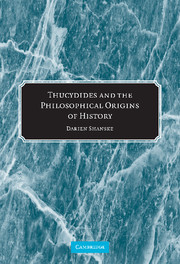Book contents
- Frontmatter
- Contents
- Acknowledgments
- Introduction
- 1 Thucydides's Vision
- 2 The Case of Pericles
- 3 Deinon, Logos, and the Tragic Question Concerning the Human
- 4 Thucydidean Temporality
- Appendix I Restoring Key Terms 1.1–1.23
- Appendix II Pretragic History of Deinon
- Appendix III Wittgenstein on Fly-Bottles, Aspect Seeing, and History
- Appendix IV Heidegger on World and Originary Temporality
- Notes
- Bibliography
- Index
Introduction
Published online by Cambridge University Press: 19 August 2009
- Frontmatter
- Contents
- Acknowledgments
- Introduction
- 1 Thucydides's Vision
- 2 The Case of Pericles
- 3 Deinon, Logos, and the Tragic Question Concerning the Human
- 4 Thucydidean Temporality
- Appendix I Restoring Key Terms 1.1–1.23
- Appendix II Pretragic History of Deinon
- Appendix III Wittgenstein on Fly-Bottles, Aspect Seeing, and History
- Appendix IV Heidegger on World and Originary Temporality
- Notes
- Bibliography
- Index
Summary
Restoring the Wonder of Thucydides
In 411 b.c., the city of Chios revolted from the Athenian Empire. In the midst of narrating this revolt, Thucydides states the following:
After this [battle], the Chians [now under siege] no longer came out against [the Athenians], though the Athenians ravaged their land, their land being well stocked and untouched from the time of the Persian wars until now. For, next to the Spartans, I have observed only the Chians being both fortunate and moderate, and to the extent that their polis prospered, to that extent they ordered [their polis] more securely. And even as regards this revolt, [for people] might think they did it contrary to the safer path, but they did not dare to do it until they would be putting themselves in danger with many good allies and observing that, after the disaster in Sicily, not even the Athenians themselves denied any longer that their affairs were entirely and certainly desperate. And if [the Chians] were overthrown by that which is unexpected in human life, they held the opinion that was in error with many others who thought the same things, that the [power] of Athens would be quickly and utterly destroyed.
This does not appear to be a very remarkable passage in any sense. Both the facts, such as that the Chians were completely under siege despite their initial strength, and the analysis, namely, that Athens's resilience was surprising, seem fairly simple.
- Type
- Chapter
- Information
- Thucydides and the Philosophical Origins of History , pp. 1 - 14Publisher: Cambridge University PressPrint publication year: 2006

